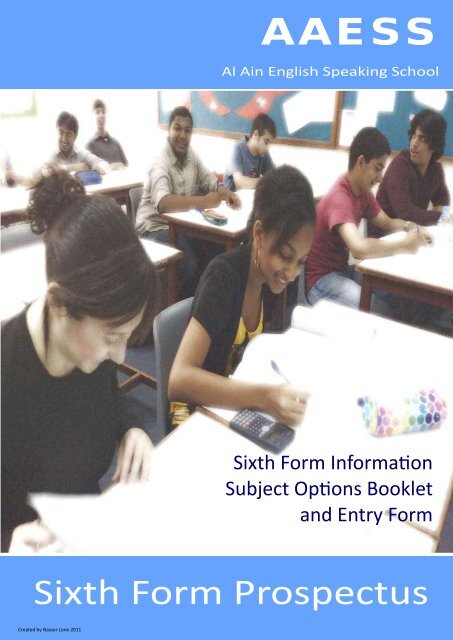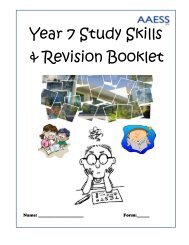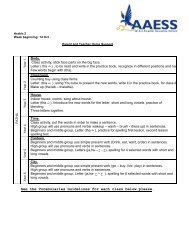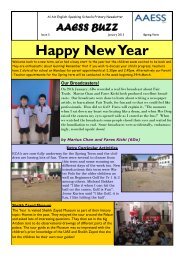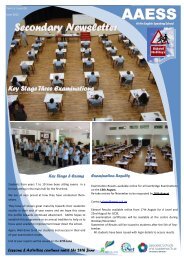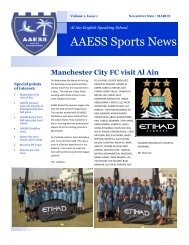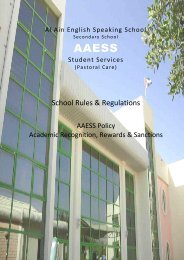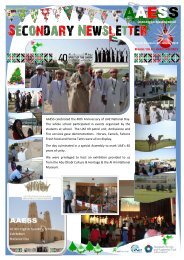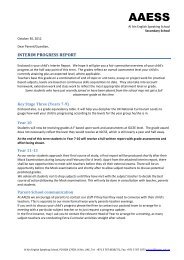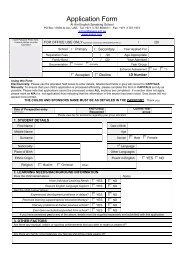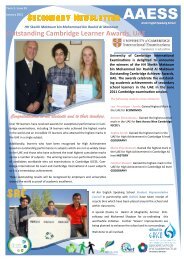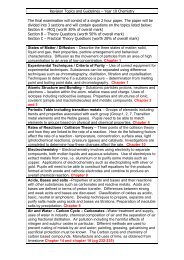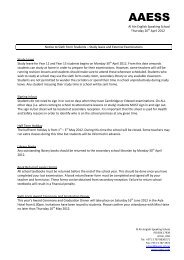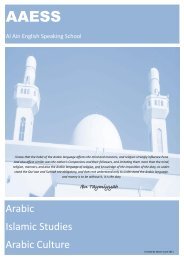AS Level - Al Ain English Speaking School AAESS
AS Level - Al Ain English Speaking School AAESS
AS Level - Al Ain English Speaking School AAESS
You also want an ePaper? Increase the reach of your titles
YUMPU automatically turns print PDFs into web optimized ePapers that Google loves.
<strong>AAESS</strong><br />
<strong>Al</strong> <strong>Ain</strong> <strong>English</strong> <strong>Speaking</strong> <strong>School</strong><br />
Sixth Form Information<br />
Subject Options Booklet<br />
and Entry Form<br />
Sixth Form Prospectus<br />
Created by Nasser Lone 2011
INTRODUCTION<br />
Entry to Year 12 is based on an interview with the<br />
Head of the Sixth Form, and Head of Secondary and<br />
a minimum of Five GCSE passes, (Grade C or above)<br />
and a teacher recommendation for the subject to be<br />
studied.<br />
Usually, subjects selected to be studied at A <strong>Level</strong><br />
require at least a grade B pass at GCSE. So that students<br />
have a solid foundation leading into Year 12.<br />
What are the demands at <strong>AS</strong> and A <strong>Level</strong>?<br />
2<br />
At the end of two years in the Sixth Form, we<br />
expect students to have achieved a good quality<br />
set of Advanced Subsidiary (<strong>AS</strong>) and Advanced<br />
<strong>Level</strong> grades, to have developed their skill in<br />
sports, and to move on to university as fully responsible<br />
adults with a strong sense of self worth.<br />
The systems, structures and opportunities created<br />
for the Sixth Form are designed to achieve all<br />
these goals, not just good A <strong>Level</strong> grades.<br />
Until universities move away from demanding good Advanced <strong>Level</strong> grades for admission, we will continue to<br />
focus on achieving these. However, even though three A <strong>Level</strong>s will continue to be at the heart of the curriculum,<br />
we expect the majority of students to begin Year 12 by following at least four <strong>AS</strong> <strong>Level</strong> courses. At the start<br />
of Year 13, the study of one of these may be discontinued whilst the others are taken through to full A <strong>Level</strong>s.<br />
You may find the following questions and answers helpful. If you have any others, please do contact the Head of<br />
Sixth Form.<br />
At <strong>Al</strong> <strong>Ain</strong> <strong>English</strong> <strong>Speaking</strong> <strong>School</strong> we place great emphasis on each student achieving their full potential and in<br />
order to do this we aim to work closely with parents and students in choosing the correct balance of subjects to<br />
follow in the 6th form.<br />
We offer a wide range of subjects and the descriptions in this book are to give both parents and students an<br />
insight into what the subject will involve.<br />
However, before choosing your subjects we would encourage you to meet the subject teachers and discuss<br />
whether a particular subject is the right choice for you. I would also recommend talking with our Head of Sixth<br />
Form and Headteacher, about subject combinations, to ensure that the chosen subjects form a balanced course<br />
of study and will provide students with the background needed to find a suitable university place.<br />
Why study A levels?<br />
The A level qualification has been the gold standard for entry into UK universities since its introduction and is<br />
recognized throughout the world as a sound basis for pursuing a university education. The introduction in the<br />
last decade of the option to study a number of subjects to <strong>AS</strong> level in Year 12 has allowed students to study a<br />
broader range of subjects and then to concentrate on pursuing key subjects to A level in Year 13.<br />
It is expected that compared to GCSE, study of <strong>AS</strong> <strong>Level</strong> subjects will impose greater demands on the student. In<br />
addition to the sheer size of the syllabus and the quantity of work to be covered, some of the topics will prove<br />
challenging. This inevitably means that the student will need to revisit them, perhaps several times, before they<br />
are fully grasped and understood. Sixth Formers can expect to do considerable extra research and reading, and<br />
to structure their use of personal study time – it is why it exists, and is an important stepping-stone to university.<br />
In general, Sixth Formers must be prepared to take on greater responsibility for their own learning. As a<br />
rough guide, work during study-time and at home should at least be equal to the time spent in formal lessons.<br />
How are A <strong>Level</strong>s structured?<br />
There are now two parts to an A <strong>Level</strong> qualification: an <strong>AS</strong> taken at the end<br />
of the first year in the Sixth Form, and an A2 (the full award) taken at the<br />
end of the second year. The full A <strong>Level</strong> will be made up from units of work:<br />
3 units will be studied for <strong>AS</strong> and a further 3 for A2 to complete the full A<br />
<strong>Level</strong> course.<br />
Created by Nasser Lone 2011
INTRODUCTION<br />
What courses are on offer at A <strong>Level</strong>?<br />
Art,<br />
Arabic,<br />
Biology,<br />
Business Studies,<br />
Chemistry,<br />
<strong>English</strong> Language,<br />
Geography,<br />
History,<br />
Applied Information Communication Technology,<br />
Mathematics, (inc. Mechanics & Statistics)<br />
Modern Foreign Languages (MfL) French or Spanish<br />
Physical Education,<br />
Physics,<br />
Music, Psychology, Further Maths, Drama, Economics , General Studies and Spanish (*)<br />
* Denotes: to be confirmed, or dependent on numbers<br />
What about the standard of the <strong>AS</strong><br />
(Advanced Subsidiary) <strong>Level</strong>?<br />
The standard of work is designed to bridge the<br />
gap between GCSE and A <strong>Level</strong>. The <strong>AS</strong> will be<br />
worth 50% of the A <strong>Level</strong> assessment. These<br />
qualifications will have a value in their own<br />
right.<br />
What should be considered in designing<br />
a course of study?<br />
Higher education institutions’ entrance regulations<br />
should be checked for essential or<br />
preferred A <strong>Level</strong> subjects. Aptitude for the<br />
subjects is another obvious prerequisite. Ability<br />
to cope with workload, time management and<br />
organisational skills of the student are also important<br />
factors. The usual choice will be to<br />
choose four subjects from the subjects on offer<br />
at A <strong>Level</strong>. There will then be the opportunity<br />
to discontinue one these in Year 13 after taking<br />
the <strong>AS</strong> examination. The alternative is to<br />
choose three from the subjects on offer at A<br />
<strong>Level</strong> and then one from the two subjects on<br />
offer as a one year <strong>AS</strong> course.<br />
Created by Nasser Lone 2011<br />
What is ‘cashing in’?<br />
‘Cashing in’ occurs when a student uses the marks which<br />
they have scored in <strong>AS</strong> or A2 examinations to obtain a<br />
certificate from the examining board. Sixth Formers pursuing<br />
the normal full, six unit, two year course in a subject will<br />
usually ‘cash in’ at the end of Year 13.<br />
Where a student is studying a one year <strong>AS</strong> <strong>Level</strong> course or is<br />
not continuing the study of a subject taken in Year 12 into<br />
Year 13, they may request to ‘cash in’ at the end of year 12.<br />
<strong>Al</strong>ternatively, this option may be exercised later when the<br />
student elects to re-sit a unit or units in an effort to score<br />
higher marks.<br />
‘Cashing in’ is particularly useful when a student has to leave<br />
<strong>Al</strong> <strong>Ain</strong> <strong>English</strong> <strong>Speaking</strong> <strong>School</strong> at the end of Year 12. It gives<br />
the student a UK recognised qualification beyond GCSE<br />
standard. The <strong>AS</strong> <strong>Level</strong> certificate can be used to gain access<br />
to employment or to an A2 course in a UK curriculum education<br />
institution elsewhere.<br />
<strong>AS</strong> is also accepted by USA universities for<br />
advanced placement.<br />
For more detailed advice on the complicated and<br />
ever changing process of ‘cashing in’ please contact<br />
the examinations team at the school.<br />
3
Guidance for Entry<br />
University Applications and Funding<br />
Applications to British Universities and Colleges are made through UC<strong>AS</strong>, which is a Clearing House system<br />
where an on-line service allows an application for up to five universities. The process starts at the beginning of<br />
Year 12, with completed applications being dispatched in December of the following year.<br />
Applications to Oxbridge, medicine, dentistry, and veterinary sciences are sent in slightly earlier.<br />
<strong>Al</strong>l <strong>AAESS</strong> candidates are registered for UC<strong>AS</strong> by the school and should not register<br />
individually.<br />
For students considering the USA, Canada, Australia and South African applications are made directly to the individual<br />
university during the final year. Some American institutions have a common application form, but most<br />
need an individual one. SATs scores are required by all North American universities and in addition a TOEFL<br />
qualification may be needed by most Canadian institutions and American university if the applicant does not<br />
hold current US citizenship. SAT advise is available from the school.<br />
Students intending to further their studies in the UAE or Europe are also offered advise and support on their<br />
application process<br />
Advice on which course and which university comes from the Head of Sixth Form, the Head teacher and subject<br />
staff in general. Students are also able to research possibilities through the internet and the UC<strong>AS</strong> CD-Rom and<br />
Over the years, the school has acquired considerable expertise in the placing of students and has also become<br />
known to Universities in Britain as producing first-class undergraduates. Virtually all our applicants are offered<br />
places in their first choice University.<br />
Created by Nasser Lone 2011<br />
4
Guidance for Entry to the Sixth Form<br />
Please read the following information carefully before filling in the attached form (at<br />
the end of this publication) for requesting subject choices for the sixth form.<br />
At <strong>AAESS</strong> we construct the timetable for A <strong>Level</strong> subjects in accordance, as far as possible,<br />
with student demand. The process is operated as follows:<br />
Students choose their preferred subjects.<br />
Heads of Departments vet suitability of choice.<br />
Subject blocks are constructed, which will hopefully offer all students who have<br />
indicated that they wish to definitely continue into Sixth Form their choice of study.<br />
This process is completed by Easter so that timetable construction may be carried out<br />
in the summer term.<br />
After this initial choice students may, of course, change their minds, but will need to<br />
realize that, just as in the Year 9 option process, change will be dependent on space<br />
being available in the class and that the subjects do not “clash” on the timetable.<br />
Most students will follow/<br />
choose the following options<br />
a) Choose to study 4 subjects from<br />
the list of A <strong>Level</strong> subjects. It is<br />
expected that one of these<br />
subjects will be “dropped” at the<br />
end of year 12. Taking four full<br />
A-<strong>Level</strong>s must be discussed with<br />
the head of Secondary and the<br />
subject teachers.<br />
b) Muslim students will need time<br />
to have Islamic Study lessons.<br />
Subjects on offer at <strong>AAESS</strong><br />
Please remember to write subjects chosen in order<br />
of preference so that we can prioritise and allocate<br />
students their most desired choices first.<br />
Finally<br />
Please note that subjects on offer need a minimum number of<br />
students to operate. This will be confirmed after option choices<br />
have been made.<br />
Any student who is, unsure whether he/she is returning to the<br />
Sixth Form should see the Head of Secondary as soon as plans<br />
become definite so that they may be included in the option process<br />
and given their choice of subjects.<br />
Art, Arabic, Biology, Business Studies, Chemistry, <strong>English</strong> Language, Geography, History, Applied Information<br />
Communication Technology, Mathematics, (inc. Mechanics & Statistics) Modern Foreign Languages (MfL)<br />
French or Spanish, Physical Education, Physics,<br />
Government & Politics, Further Maths, Drama, Economics , General Studies and Spanish (*)<br />
* Denotes: to be confirmed, or dependent on numbers<br />
This will provide a taught week of 24 lessons. The remaining 16 lessons may be used for private research, PE,<br />
community service, working on practical projects, university applications etc...<br />
Created by Nasser Lone 2011<br />
5
<strong>AAESS</strong> Student Expectations<br />
AIMS<br />
The aims are to:<br />
create a calm, considerate and safe environment in which students can maximize their learning<br />
potential;<br />
provide an environment which allows students to bridge the gap between their experiences of<br />
school and higher education;<br />
provide an environment within which the uniquely individual value of each student is recognised<br />
and appreciated;<br />
promote a fair system which recognises and rewards achievement; and<br />
ensure that students understand clearly what is expected of them and what they may expect<br />
from administrative and teaching staff.<br />
New Sixth Form students are asked to read and sign a ‘Learning Agreement’, (copies<br />
available from the Head of Sixth Form). It summarises the expectations which we have<br />
of our students and their behaviour whilst also defining staff obligations for dealing<br />
with Sixth Form students.<br />
SPECIFIC ISSUES<br />
Absence<br />
If a student has been absent s/he is expected to produce an absence note on the day of return. If the<br />
absence is for more than one day s/he (or parent) should ring the secondary school office to inform the<br />
Head of Sixth Form of the reason for absence and the likelihood of length of time away.<br />
Absence from individual lessons is taken very seriously. Any student whose poor attendance in class is<br />
causing concern will be seen by the Head of Sixth Form and parents may be contacted either initially or<br />
after the student has been given the chance to improve attendance.<br />
Students are expected to be present at 7.50 am and will only be marked as present if<br />
they are in the room.<br />
Any student who arrives at registration after 7.55 am is marked as late and must sign in<br />
at the Secondary <strong>School</strong> Office.<br />
If a form tutor is concerned about a student’s poor attendance a letter will be sent to the student’s<br />
parents and the student warned that the problem must be remedied.<br />
Created by Nasser Lone 2011<br />
6
<strong>AAESS</strong> Student Expectations<br />
Mobile telephones<br />
Sixth Formers may only use mobile<br />
phones in the social area of the<br />
Sixth Form i.e. the Common room<br />
outside of normal lesson times.<br />
They MUST be switched off during<br />
lessons and should not be used<br />
around the school site or in the<br />
study area.<br />
Computers<br />
Computers are available for use during study periods in the Sixth Form<br />
Centre and in the ICT labs, (students must seek permission from the<br />
Head of ICT to use labs during other classes).<br />
Users must log off after use and close down the computer. THE<br />
COMPUTERS MUST BE CLOSED DOWN BY 3.00pm EACH DAY unless any<br />
students is working late and closes the computer before she leaves the<br />
area.<br />
ALL students must sign the <strong>School</strong>s Computer User Policy<br />
Unsatisfactory performance (e.g. poor attendance, failure to meet deadlines,<br />
failure to prepare for/ attend examinations)<br />
Any student whose academic performance is unsatisfactory is dealt with on an individual basis. Initially the<br />
Head of Sixth Form will interview the students. Targets will be set and if these are not met parents/carers will<br />
be asked to attend a meeting with the Head of the Sixth Form and Headteacher and a contract will be drawn<br />
up. If the terms of the contract are not met within a specified time the student may lose her Sixth Form place.<br />
Pastoral Care<br />
Rewarding of effort<br />
At certain key points in the year the Head of Sixth Form sends out<br />
congratulatory letters to Sixth Formers whose reports and/or exam<br />
results show evidence of substantial effort and academic attainment.<br />
The exact dates are dependent on the time of year when progress<br />
assessments take place.<br />
Each member of the Sixth Form develops and maintains a close relationship with a Form Tutor who has<br />
contact with each student on a day to day basis. As well as this constant support, the Head of Sixth Form is<br />
available to help and support students with personal or academic matters. This ‘Open Door’ policy is<br />
maintained in all aspects of Sixth Form life.<br />
Sixth Formers are also welcome to speak to the Headteacher or Deputy Head at any time.<br />
Created by Nasser Lone 2011<br />
7
<strong>AAESS</strong> Student Expectations<br />
Leisure and Recreation<br />
Within school, the Sixth Form Centre is the hub of social activity, where students can relax in the breaks and<br />
study during their non-contact time.<br />
Many Sixth Formers are members of the school’s sports teams have the opportunity to be involved in<br />
competitions with other schools in Dubai and further a field. Apart from team practices and Physical Education<br />
lessons, students are given the option of selecting activities from a number of other sports.<br />
Year 12 students may well find that there are many trips and events on offer: the London theatre trip, Duke of<br />
Edinburgh expedition to Nepal, ski trip and the Biology and Geography field trips. Clearly, from the point of view<br />
of time away from the curriculum, as well as the potentially huge financial cost to parents, careful selection<br />
needs to be made, with priority given to ones that most benefit the curriculum.<br />
Sixth Formers are considered to be at the centre of school life and are given many leadership opportunities<br />
during their time at <strong>AAESS</strong>, for example:<br />
SRC<br />
Sixth Form Students are urged to take an active role in the Student Representative Council.<br />
This sets a good example for the younger students and promotes leadership qualities for the sixth form student.<br />
Each year a Head Boy or Head Girl are elected by the student body.<br />
Prefects<br />
Sixth Form students are appointed as prefects and are responsible for a particular form group. As a prefect they<br />
are responsible for accompanying their form class to assembly, assisting during PSHE lessons and monitoring<br />
the school grounds during break.<br />
Duke of Edinburgh<br />
This is an excellent award for Sixth Form students to receive as it promotes leadership qualities and communication<br />
skills.<br />
<strong>School</strong> Magazine and Year Book<br />
Sixth Form students are actively involved in the compilation of the <strong>School</strong> Magazine and Year Book. They form<br />
the backbone of the editorial team guiding other students along the way.<br />
In Addition<br />
Many sporting and artistic opportunities……….<br />
Sixth Form students are expected to be good role models for<br />
younger students, providing inspiration and guidance. They<br />
should support the ethos of the school and support the school<br />
staff.<br />
Created by Nasser Lone 2011<br />
8
Art<br />
Art and Design at <strong>AAESS</strong> will be studied and examined as a FINE ART option.<br />
Internally Set Assignment<br />
Students will be guided in their topic choice for<br />
coursework for <strong>AS</strong>. This study will be created and<br />
explored for the entire year. The A2 Fine Art course is<br />
similar to this, and is an extension of this work, with a<br />
personal study.<br />
CAREER PROSPECTS<br />
The usual (UK) route for students wishing to follow a career in Art and Design,<br />
following GCE examinations, is for them to go on to a ‘foundation course’ in<br />
Art and Design. This gives an intensive, full time, 1 year, grounding in Art and<br />
Design. This route is highly recommended. Following this, students usually go<br />
on to take a ‘BA’ qualification lasting 3 years, in one of the numerous areas of<br />
art and design which are open to them (eg; Fine Art, Ceramics, Graphic<br />
Design, Industrial Design, etc.). Later, students may even wish to take a<br />
Masters Degree. Some students forgo the undeniable pleasure of a foundation<br />
course and go straight on to ‘BA’ courses.<br />
There are many private colleges that offer excellent Graphic Design courses,<br />
and are geared towards gearing students for advertising, publishing, various<br />
computer graphics careers and the packaging industry.<br />
Most careers in the Fashion, Interior Design, Architecture Industry all would<br />
see the GCS Art and Design Course as a good start to the introduction of their<br />
University studies.<br />
9<br />
<strong>AS</strong> and A <strong>Level</strong><br />
Externally Set Assignment<br />
Students again produce coursework from a preset<br />
examination paper, over a period of time prior to the<br />
exam, and then produce a “final piece” on the day of<br />
the exam within the set period given.<br />
Examination work and coursework are graded (marked) according to the following 4 Assessment Objectives:<br />
Assessment Objective 1<br />
Recording observations & experiences, ideas, information etc. 25% <strong>AS</strong>/A2<br />
Assessment Objective 2<br />
Analyse and evaluate images, artefacts etc., showing understanding of purposes, meanings and contexts.<br />
25% <strong>AS</strong>/A2<br />
Assessment Objective 3<br />
Develop ideas through investigations selecting and using materials etc. 25% <strong>AS</strong>/A2<br />
Assessment Objective 4<br />
Complete personal and informed finished work & explain connections. 25% <strong>AS</strong>/A2<br />
SUMMARY OF ARTWORK UNITS<br />
<strong>Level</strong> Unit Code Component Weighting<br />
<strong>AS</strong> 6FA01 Unit 1 Course work 30% ‘A2’ 60% ‘<strong>AS</strong>’ <strong>Level</strong><br />
6FA02 Unit 2 Externally Set Assignment 20% ‘A2’ 40% ‘<strong>AS</strong>’ <strong>Level</strong><br />
A2 9FA03 Unit 3 Coursework & Personal Study 30% ‘A2’<br />
9FA04 Unit 4 Externally Set Assignment 20% ‘A2’<br />
IGCSE QUALIFICATIONS<br />
REQUIRED<br />
Candidates for these examinations<br />
should satisfy themselves (possibly<br />
through dialogue with their art teacher)<br />
that they understand and can complete<br />
work which satisfies these objectives<br />
over the period of the course.<br />
Candidates ought also to have gained<br />
a minimum of grade ‘C’ at GCSE/IGCSE<br />
Art and Design (as well as other GCSE<br />
qualifications displaying similar academic<br />
performance) or be able to<br />
show through a folio of work that they<br />
meet this standard.<br />
EDEXCEL<br />
Specification 6FA01 (<strong>AS</strong>)<br />
Specification 9FA01 (A2)<br />
GENERAL REQUIREMENTS<br />
It is a general requirement that students entering upon Art ‘A’ level understand that the degree of involvement<br />
required of them is substantial. ‘A’ level Art requires a level of thinking and involvement with ideas which is far in<br />
excess of IGCSE requirements. <strong>Al</strong>so, the amount of practical work required for ‘<strong>AS</strong>’ level and<br />
later for ‘A2’ level is not easily achievable in one short academic year. Students must be prepared<br />
for the level of commitment involved.<br />
Created by Nasser Lone 2011
Arabic<br />
Course Outline First Language Arabic<br />
In the first year, students explore General Topic Areas 1. 2 and 3 and study vocabulary and grammar to build<br />
up their competence and knowledge of Arabic society and culture. From the end of the first year, they will<br />
additionally explore General Topic Areas 4 and 5, study the grammar required for A level, work in depth on a<br />
topic or text based on Arabic society or culture, and begin the see the subject in a broader inter-cultural<br />
perspective.<br />
<strong>AS</strong> Assessment<br />
Unit Code Title/description Method of assessment Distribution of marks<br />
1 6012 Reading and writing Externally assessed 100% <strong>AS</strong><br />
Examination (3 hours) 50% A <strong>Level</strong><br />
Unit 1 is divided into three sections; Reading and Writing, Translation and Continuous Writing<br />
A2 Assessment<br />
Unit Code Title/description Method of assessment Distribution of marks<br />
2 9602 Reading and Writing Externally assessed 100% A2<br />
Topics and Texts Examination (3 hour) 50% A' level<br />
This course is appropriate for speakers of Arabic with a grade B or Higher at<br />
GCSE.<br />
Career prospects<br />
Arabic is of course a widely spoken language and the ability to read and write it provides for excellent opportunities for<br />
further study and work around the world. It is not only a language of increasing importance due to the current global<br />
political and economic climate; but also a language with such a wealth of history and culture that an <strong>AS</strong> / A' level should<br />
only scratch the surface and open the mind to further learning!<br />
The opportunities for travel and the myriad of cultural experiences that become available to language students are also<br />
endless and the ability to communicate effectively can only enrich any experience.<br />
A knowledge of languages will give you an advantage in just about any kind of work, not just translating or language<br />
teaching!<br />
Here are some examples of areas of work other than specialist languages jobs that you could use your languages for:<br />
business and service industries, central and local government, engineering, event management, financial services,<br />
marketing, media, public services, technology, travel and tourism and the voluntary and charitable sectors. Look at<br />
www.cilt.org.uk for more inspiration.<br />
Created by Nasser Lone 2011<br />
10<br />
<strong>AS</strong> and A <strong>Level</strong><br />
EDEXCEL<br />
Specification 6012 (<strong>AS</strong>)<br />
Specification 9602 (A2)
Biology<br />
Who can join the course?<br />
You should have studied Biology at GCSE level and have obtained or be predicted a minimum of a grade C.<br />
<strong>AS</strong> or A level Biology builds upon the knowledge and skills developed in GCSE Biology.<br />
It is also recommended although not absolutely essential that you have studied Chemistry at GCSE level and<br />
have obtained or be predicted a minimum of a grade C. This is because some parts of the <strong>AS</strong> level Biology<br />
course deal directly with elements of biochemistry. Students who are doing <strong>AS</strong> level Chemistry will find that<br />
there is a slight element of overlap in terms of content on both the <strong>AS</strong> Chemistry and <strong>AS</strong> Biology courses.<br />
In addition to a sound background knowledge of biology; it is helpful for the prospective biology student to<br />
have a more general knowledge of how to tackle a problem and apply logical reasoning to arrive at a solution.<br />
Good biologists will read voraciously, on all topics (including, of course, science). Keep an eye on the news for<br />
the latest developments in science and medicine. Biology is an area of science which still continues to rapidly<br />
evolve as our understanding of the human body and the natural world deepens.<br />
One final requirement to being a good biologist is good study skills. Pay attention in class and take notes.<br />
Review the notes while reading the textbook, and add more notes if the book explains something better or<br />
differently than the teacher did. Look at the examples. And do your homework, even if it's not being graded.<br />
What are the aims of the <strong>AS</strong> and A2 Biology<br />
Courses?<br />
The <strong>AS</strong> and A2 Biology course aim to provide, through welldesigned<br />
studies of experimental and practical biological<br />
science, a worthwhile educational experience for all<br />
students, whether or not they go on to study science<br />
beyond this level and, in particular, to enable them to<br />
acquire sufficient understanding and knowledge to<br />
become confident citizens in a technological world<br />
and able to take or develop an Informed interest in<br />
matters of scientific import;<br />
recognise the usefulness, and limitations, of scientific<br />
method and to appreciate its applicability in other<br />
disciplines and in everyday life;<br />
be suitably prepared for studies beyond A <strong>Level</strong> in<br />
biological sciences, in further or higher education,<br />
and for professional courses.<br />
The courses will also develop abilities and skills that:<br />
are relevant to the study and practice of biological<br />
science;<br />
are useful in everyday life;<br />
encourage effective, efficient and safe practice;<br />
encourage effective communication using universal<br />
scientific conventions.<br />
Created by Nasser Lone 2011<br />
11<br />
A and A/S <strong>Level</strong><br />
Cambridge International<br />
Examinations Board<br />
9700<br />
<strong>AS</strong> and A2 Course Structure at<br />
<strong>AAESS</strong><br />
The topics studied are:<br />
Cell structure<br />
Biological molecules and enzymes<br />
Cell membranes and transport<br />
Cell and nuclear division<br />
Genetic control<br />
Transport<br />
Gas exchange<br />
Infectious diseases and immunity<br />
Ecology<br />
Energy and respiration (A2 only)<br />
Photosynthesis (A2 only)<br />
Regulation and control (A2 only)<br />
Inherited change, selection and evolution<br />
(A2 only)<br />
Applications of biology (A2 only)
Business Studies<br />
Business Studies is an academic subject taught in Years 12 and 13. Students are prepared for the Edexcel <strong>AS</strong>/<br />
A2 examination in Business Studies which they sit at the end of year 12 and year 13 respectively.<br />
The <strong>AS</strong> syllabus covers the following key areas of study<br />
Developing new business ideas<br />
Managing the business<br />
The A2 syllabus covers the following key areas of study<br />
International Business<br />
Making business decisions<br />
Why should I take business studies?<br />
You can apply the knowledge you learn to real life<br />
business situations!!<br />
It is viewed favourably by employees.<br />
Good for jobs in Management. Finance, Law, Marketing<br />
or any job in a business environment!!<br />
Combines well with geography, mathematics and<br />
languages<br />
Good preparation for the world outside of school<br />
The Business Studies syllabus for <strong>AS</strong> and A <strong>Level</strong> is a good<br />
lead into Diplomas in Business, Business Administration,<br />
Business Administration (Travel & Tourism), Human Resource<br />
Management, Accounting and Finance, Marketing<br />
and Sales Management as well as University Business courses.<br />
What about the examination?<br />
The <strong>AS</strong> examination consists of two written papers, both<br />
1hour and 15 minutes with multiple choice questions and<br />
data response questions.<br />
The A2 level examinations consists of two written papers,<br />
both 1hour and 30 minutes and includes data response<br />
questions and interpreting a case study.<br />
Created by Nasser Lone 2011<br />
12<br />
<strong>AS</strong> and A <strong>Level</strong><br />
EDEXCEL<br />
Specification 6BS01, 6BS01(<strong>AS</strong>)<br />
Specification 6BS03, 6BS03(A2)<br />
What will I be doing in business<br />
studies?<br />
Studying a range of topics where you will:<br />
Participate in group work<br />
Make presentations<br />
Solve real life business problems<br />
Make up your own business ideas<br />
Have class discussions<br />
Solve problems and evaluate your<br />
own ideas<br />
What do I need to take business<br />
studies?<br />
There is no prerequisite to have<br />
taken IGCSE business studies<br />
An interest in the world around<br />
you!<br />
Show initiative<br />
Be enthusiastic<br />
Be hard working
Chemistry<br />
A and <strong>AS</strong> <strong>Level</strong> Chemistry builds on the skills acquired at IGCSE (or equivalent) level.<br />
The syllabus includes the main theoretical concepts which are fundamental to the subject, a section on some<br />
current applications of chemistry, and a strong emphasis on advanced practical skills. Practical skills are<br />
assessed in a timetabled practical examination. The emphasis throughout is on the understanding of concepts<br />
and the application of chemistry ideas in novel contexts as well as on the acquisition of knowledge. The<br />
course will foster creative thinking and problem-solving skills which are transferable to any future career path,<br />
and A and <strong>AS</strong> <strong>Level</strong> Chemistry is ideal for students who want to study chemistry or a wide variety of related<br />
subjects at university or to follow a career in science.<br />
Do you enjoy practical laboratory work?<br />
Are you someone who can cope fairly easily with Math's and like to use number work in problem solving?<br />
Are you intrigued by the science that you have studied so far, and prepared to work hard to find out more?<br />
Why study this subject?<br />
Why is copper sulphate blue? Why does ice float<br />
on water? If you want to be able to explain things<br />
like this, and to learn more about the fascinating<br />
and varied world of the elements, then Chemistry<br />
is the course for you.<br />
Chemistry is an essential qualification for a large<br />
number of careers as well as being an excellent<br />
subject to study alongside any other A <strong>Level</strong>. A<br />
large number of our students move on into areas<br />
such as Applied Chemistry, Chemical Engineering,<br />
Medicine, Dentistry, Pharmacy, Biochemistry,<br />
Biotechnology and Environmental Science. If you<br />
want any science-based career, then Chemistry<br />
keeps your options open. Chemistry <strong>AS</strong> in itself is<br />
certain to be a very useful qualification. <strong>Al</strong>most all<br />
of our students tell us that they really do enjoy the<br />
Chemistry course at <strong>AAESS</strong> and for many of them it<br />
becomes a highly successful and rewarding A <strong>Level</strong><br />
that helps them in their further studies.<br />
Career Prospects<br />
What is the course content?<br />
Chemistry is the science of materials. It is about gases,<br />
liquids and solids; how they interact and how they may<br />
be made. Think about plastics, pesticides and drugs;<br />
fireworks, fuels and explosives. Chemistry is, literally,<br />
everywhere.<br />
In <strong>AS</strong> Chemistry you will cover topics such as atomic<br />
structure, bonding and the Periodic Table. You will also<br />
learn about rates of reaction, organic chemistry,<br />
energetics and environmental issues.<br />
In the second year the topics are covered in greater<br />
depth with further emphasis on analytical techniques<br />
and the application of chemical understanding in the<br />
world around us.<br />
The topics studied are widely inter-linked and the<br />
developing patterns are a distinguishing feature of this<br />
subject. Practical work is used throughout the course<br />
both to illustrate concepts and to enable the development<br />
of technical and investigative skills.<br />
Anatomy, Astronomy, Ecology, Nutrition, Pathology, Physics , Physiology, Biology, Geoscience , Environmental<br />
Science, Botany, Healthcare, Medicine, Zoology, Marine Science, Technician, Drug Development, Clinical<br />
Research, Veterinary Medicine, Cancer Research, Botany , Sales, Public Health, Drug Development, Computer<br />
Science.<br />
Created by Nasser Lone 2011<br />
13<br />
<strong>AS</strong> and A <strong>Level</strong><br />
Cambridge International<br />
Examinations Board<br />
9701
Drama<br />
<strong>AS</strong> and A <strong>Level</strong> GCE Drama and Theatre Studies<br />
Students need to have:<br />
curiosity about issues and ideas<br />
a creative instinct for communication through drama<br />
interested in gaining a greater understanding of how theatre and plays work<br />
an interest in acting, writing or being involved in performance work<br />
(visual and technical aspects of theatre)<br />
an interest in theatre companies and their work.<br />
Key Skills developed within the course:<br />
communication skills<br />
discuss and present ideas and opinions concerning a drama production you have seen or taken part in problem solving<br />
working within time and budget constraints to create effective performances co-operative learning in a team<br />
collaborative work with performers and designers in production work improving personal learning and performance<br />
having a role in some aspect of performance work acting/directing/technical) and keeping a personal log of events and<br />
reflective comments<br />
Information Technology<br />
Using the Internet as a research tool, using videos, digital cameras and computers to produce programmes and notes on<br />
production work<br />
Application of numeracy skills<br />
Utilise appropriate measurements or statistics in budgeting and theatre design .<br />
<strong>AS</strong> consists of three units<br />
Unit 1 Exploration of drama and theatre (15%)<br />
Study a minimum of two plays by one or more<br />
playwrights (exploration can be through practical<br />
workshops).<br />
Study the plays to understand structure and how to<br />
develop the play as a live performance.<br />
Study of famous theatre directors or companies.<br />
Unit 2 Text in Performance 1 (20%)<br />
Perform a role in the production of a play (not plays<br />
from unit 1, but could be one of the playwrights).<br />
Preparation through workshops to help develop<br />
performance or design skills. Several scenes from<br />
different plays can be explored to find an appropriate<br />
choice for the group.<br />
Unit 3 Text in context 1 (15%)<br />
a. This is linked to Unit 2 - the role of performer or<br />
designer in the production of a play. b. The second part<br />
of this unit is based on performances seen during the<br />
course.<br />
Created by Nasser Lone 2011<br />
14<br />
A2<br />
A and A/S <strong>Level</strong><br />
EDEXCEL<br />
Specification 8DR01 (<strong>AS</strong>)<br />
Specification 9DR01 (A2)<br />
The full Advanced GCE qualification is made up of<br />
the <strong>AS</strong> units plus three more units studied at a<br />
higher level.<br />
Unit 4 Devising (20%)<br />
Working with a group (minimum 3, maximum 12)<br />
students devise an original piece of drama for<br />
presentation to a particular audience (e.g. primary<br />
school).<br />
Unit 5 Text in Performance 2 (15%)<br />
An in depth study of one further play from the<br />
viewpoint of a director, designer or performer.<br />
Assessment. This work is assessed by a visiting<br />
examiner.<br />
Unit 6 Text in Context 2 (15%)<br />
This final unit requires the study of another two<br />
plays.<br />
Section A- study one play from a choice of two from<br />
the point of view of a director.<br />
Assessment is by a two and a half hour written exam.
Economics<br />
Economics is a Social Science that studies the CHOICES that individuals, business, governments and entire<br />
societies make as they cope with SCARCITY and the INCENTIVES that influence and reconcile those choices.<br />
(Michael Parkin)<br />
Why I should study Economics?<br />
To understand the world better<br />
To gain self-confidence.<br />
To achieve social change.<br />
To help prepare for other careers.<br />
To become an economist.<br />
15<br />
<strong>AS</strong> and A <strong>Level</strong><br />
Cambridge International<br />
Examinations Board<br />
9708<br />
Economics will help you develop a range of<br />
skills, including:<br />
Analytical and problem solving skills.<br />
Numerical and computing skills.<br />
Communication skills.<br />
Team working skills.<br />
Political Awareness.<br />
‘…it is hard to find any aspect of life about which economics does not have something important to say’.<br />
(Robert Hall and Marc Lieberman)<br />
Economics is a way of thinking, knowledge of economics is a valuable decision making tool on almost any<br />
job.<br />
Economics builds in strong analytical and critical thinking skills that could be used for real life problem<br />
solving.<br />
Economics teaches how to handle and interpret economic data useful in almost every aspect of life.<br />
Studying economics broaden your horizons and increase your ability to understand and analyze what is<br />
going on in the world of politics, business and human relations. (James D. Gwartney, Richard Stroup, Russell<br />
Sobel and David Macpherson).<br />
Syllabus, <strong>AS</strong> and A levels Economics<br />
The syllabus covers the following key areas of study:<br />
Basic economic ideas.<br />
The price system.<br />
The firm theory.<br />
Government Intervention in the price system.<br />
International trade.<br />
Theory and measurement in the Macro economy.<br />
Macroeconomic problems.<br />
Macroeconomic policies.<br />
What do I need to take Economics?<br />
There is no prerequisite to have taken<br />
IGCSE Economics.<br />
An interest in the world.<br />
Be responsible and hard working.<br />
“ Economics is an important and interesting subject that can change lives. It combines well with a number of<br />
other subjects, including Business Studies, Geography, History and Mathematics. A wide range of skills can be<br />
developed trough the study of Economics. Its strengths are recognised by many professions, and students with<br />
Economics qualifications are recruited into – for instance – accountancy, finance, journalism, law and<br />
management…<br />
…As well as benefiting individual students trough the skills, interest and greater earning potential they can gain,<br />
the study of Economics benefits the wider society. An understanding of Economics makes students more<br />
effective and more productive members of society” (Susan Grant)<br />
Created by Nasser Lone 2011
<strong>English</strong> Language<br />
<strong>AS</strong> Unit 1: Language Today<br />
Externally assessed<br />
Availability: January and June<br />
First assessment: January 2009<br />
60% of the total <strong>AS</strong> marks 30% of the total GCE<br />
marks<br />
Content summary<br />
The study of varieties of contemporary language.<br />
Students will explore how language choices reflect<br />
the identity of the user and how language use varies<br />
in context.<br />
Assessment<br />
Externally assessed examination: 2 hours 15<br />
minutes<br />
For assessment, students will complete questions<br />
from two sections. The data will be selected from<br />
material received as written or received as spoken<br />
or received as electronic.<br />
A2 Unit 3: Language Diversity and<br />
Children’s Language<br />
Development<br />
Externally assessed<br />
Availability: January and June<br />
First assessment: January 2010<br />
60% of the total A2 marks 30% of the total GCE<br />
marks<br />
Content summary<br />
Studying language diversity over time and in global<br />
contexts; children’s spoken and<br />
written language.<br />
Students will learn about origin, development and<br />
variation of language. Students will<br />
look at how and why <strong>English</strong> has changed over time,<br />
the development of <strong>English</strong> as a<br />
world language and the development of children’s<br />
spoken and written language.<br />
Assessment<br />
Externally assessed examination: 2 hours 45<br />
minutes.<br />
For assessment, students will complete questions<br />
from two sections.<br />
Created by Nasser Lone 2011<br />
16<br />
A and A/S <strong>Level</strong><br />
EDEXCEL<br />
Specification 8EN01 (<strong>AS</strong>)<br />
Specification 9EN01 (A2)<br />
<strong>AS</strong> Unit 2: Exploring the Writing Process<br />
Internally assessed<br />
Availability: June<br />
First assessment: June 2009<br />
40% of the total <strong>AS</strong> marks 20% of the total GCE marks<br />
Content summary<br />
Writing for specific genres, audiences and purposes.<br />
Students will demonstrate their skills as writers. They will<br />
explore the techniques of a variety of genres in order to<br />
produce effective texts for specific genres, audiences and<br />
purposes.<br />
Assessment<br />
Internally assessed coursework 2000-2500 words maximum<br />
For assessment, students will submit a coursework folder<br />
comprising two pieces of their own writing: one for a<br />
reading audience and one for a listening audience, both<br />
accompanied by commentaries.<br />
A2 Unit 4: <strong>English</strong> Language Investigation<br />
and Presentation<br />
Internally assessed<br />
Availability: June<br />
First assessment: June 2010<br />
40% of the total A2 marks 20% of the total GCE marks<br />
Content summary<br />
Independently researching a language topic area.<br />
Students will identify an aspect of language suitable for a<br />
research investigation, decide<br />
on the focus of their investigation, collect data, analyse it<br />
and draw relevant conclusions relating to the focus of the<br />
investigation.<br />
Assessment<br />
Internally assessed coursework<br />
2500-3000 words maximum<br />
For assessment, students will present an investigation on<br />
a topic of their own choice, utilising a methodology they<br />
have selected.
<strong>English</strong> Literature<br />
<strong>AS</strong> and A <strong>Level</strong> GCE <strong>English</strong> Literature<br />
Successful <strong>English</strong> Literature students develop an understanding and enjoyment of literary texts<br />
that is a<br />
pleasure for life, and in addition gain skills for life, including:<br />
• the ability to write clearly and effectively;<br />
• skills in developing arguments;<br />
• skills in researching and managing information;<br />
• the ability to analyse complex texts in different forms and styles.<br />
Created by Nasser Lone 2011<br />
17<br />
A and A/S <strong>Level</strong><br />
Cambridge International<br />
Exams—9695
Geography<br />
Who is this course for?<br />
Do you ………………..<br />
have an interest in and concern for<br />
travel, the environment and current<br />
affairs<br />
enjoy studying a subject that is<br />
relevant to your own life and experiences<br />
want the opportunity to carry out<br />
practical work outdoors as well as classwork<br />
enjoy problem solving and decision<br />
making<br />
want to broaden your <strong>AS</strong> or A <strong>Level</strong><br />
studies to cover both ‘sciences’ and<br />
‘humanities’<br />
What is the course about?<br />
Key knowledge<br />
During the <strong>AS</strong> course we look at the challenges faced<br />
by people in an ever changing world with increased<br />
globalisation, a rapidly growing population, unsustainable<br />
pressure on resources, greater movement of<br />
migrants and refugees, a changing climate……the<br />
breadth of topics is exciting! We seek to understand<br />
the forces that shape our environment and society<br />
and discuss management solutions for the future.<br />
At A <strong>Level</strong>, options for study include tropical, coastal<br />
and hazardous environments. In addition to these, we<br />
also investigate issues connected to environmental<br />
management, globalisation and regional<br />
development.<br />
Key Skills<br />
Both, A/S and A <strong>Level</strong> Geography also develop the full<br />
range of key skills. These include communication,<br />
problem solving, decision making, analysis and ICT. By<br />
professionals, Geography is valued for developing<br />
these transferable skills, as much as for its’ subject<br />
content.<br />
Which other courses should I do?<br />
Who can join the course?<br />
You should have studied Geography at GCSE level and have obtained /<br />
be predicted a minimum of a grade C. A/S or A level Geography builds<br />
upon the knowledge and skills developed then.<br />
It may be possible to join the course without GCSE experience. Good<br />
grades / predicted grades in GCSE <strong>English</strong>, Maths and Science subjects<br />
are essential and cases will be considered on an individual basis.<br />
What does the examination involve?<br />
Pupils will be entered for the highly prestigious University of<br />
Cambridge Examination (9696)<br />
There is no coursework requirement<br />
Pupils will sit one Paper for <strong>AS</strong> level. This examines both<br />
physical and human geography topics<br />
At A <strong>Level</strong>, pupils will be entered for 2 papers. These assess<br />
human and physical option topics<br />
<strong>Al</strong>l papers give equal weighting to physical / human aspects of<br />
the course. <strong>Al</strong>l papers include short, data response<br />
style questions as well as extended essays.<br />
Geography forms a bridge between the sciences and the humanities. Human Geography complements Economic and<br />
Business related A levels, while Physical Geography has many links with Biology and Chemistry options. Both segments<br />
of the course support ICT.<br />
Geography can lead to lots of stimulating careers such as those connected to environmental<br />
science, remote sensing, surveying, marketing and the massive growth industry of GIS.<br />
Created by Nasser Lone 2011<br />
18<br />
Key Resources<br />
<strong>AS</strong> and A <strong>Level</strong><br />
Cambridge International<br />
Examinations Board<br />
9701<br />
Pupils use a core text, “Geography : An Integrated<br />
Approach” by David Waugh. Each topic is then<br />
supplemented with a specialist book about that area<br />
of interest.<br />
Individual research and wider reading is encouraged<br />
and supported by a vast array of subject specific<br />
journals, library books, DVD’s and CD ROMs.<br />
Each pupil will be expected to participate in a<br />
number of field excursions. These day trips, plus one<br />
residential stay provide an invaluable opportunity to<br />
develop essential techniques and promote each<br />
individuals enjoyment and understanding of the subject.<br />
The cost of these is not met by the school but is<br />
kept to a minimum.
History<br />
Good Historians make excellent leaders, and excellent leaders make history.<br />
Julius Caesar, Winston Churchill, Queen Elizabeth I and Napoleon were all historians.<br />
They all changed the world…<br />
Study History, and take your place in it!<br />
Do you often ask the question<br />
“Why”? Or “ How come”?<br />
These are the most important questions of all.<br />
History is all about Why and How. It seeks to<br />
understand people’s actions, and how the human<br />
world got to where it is today. Historians<br />
try to explain why things happened, and by doing<br />
this they understand themselves and their<br />
surroundings better.<br />
Some of the topics you will examine<br />
in <strong>AS</strong> <strong>Level</strong> History:<br />
“Westward Expansion and the Taming of the<br />
West, c.1840-96”, “Civil Rights, 1895-1968”,<br />
“Boom and Bust, 1920-1941”, “The USA’s Rise<br />
as a World Power, 1890-1945“.<br />
The Source-Based Study: “The Road to<br />
Secession and Civil War, 1846-61”<br />
Students will be examined by Cambridge International<br />
Examinations (CIE), and on successful<br />
completion will therefore be awarded a universally<br />
respected qualification.<br />
Assessment Objectives<br />
Are you interested in a future career in Law?<br />
Journalism or writing? Travel and Tourism? Architecture?<br />
Diplomacy? Government? Management?<br />
Education?<br />
The skills of history are crucial to these, and many other<br />
areas. By studying history you will learn to argue, use<br />
evidence and make good judgments and decisions. You<br />
will improve your communication and linguistic skills.<br />
You will develop your thinking to the highest and most<br />
critical levels.<br />
In <strong>AS</strong> <strong>Level</strong> History you will study the<br />
USA. Why study the USA?<br />
The United States of America is currently the world’s<br />
single superpower. While this is likely to change, albeit<br />
over an uncertain period of time, the cultural, economic<br />
and political influence of the USA today is enormous. An<br />
understanding of the reasons for this dominance is<br />
crucial to the understanding of today’s world.<br />
If you take up the challenge of History at <strong>AS</strong> level, you<br />
will have the opportunity to study History at A2 level in<br />
Year 13. In A2 level you will study Modern World History,<br />
including the French and Russian Revolutions, the<br />
origins of World War 1 and Totalitarianism between the<br />
wars. For more information on A2 level history please<br />
contact the History department.<br />
Assessment is a single 3-hour paper, consisting of 3 essay questions and 1 source based question.<br />
Candidates will be expected to:<br />
1. demonstrate an understanding of the complexity of issues and themes within a historical period;<br />
2. distinguish and assess different approaches to, interpretations of, and opinions about the past;<br />
3. express awareness of historical concepts such as change and continuity, cause and effect in the past;<br />
4. present a clear, concise, logical and relevant argument;<br />
5. evaluate and interpret source materials as historical evidence and demonstrate facility in their use.<br />
Objectives 1-4 will be tested in essay questions. No attempt will be made to allocate mark weightings separately<br />
to these four objectives. Objective 5 will be tested in source-based questions.<br />
Created by Nasser Lone 2011<br />
19<br />
<strong>AS</strong> and A <strong>Level</strong><br />
Cambridge International<br />
Examinations Board<br />
9701
Mathematics<br />
<strong>AS</strong><br />
Core Maths 1 (C1), Core Maths 2 (C2), Statistics 1 (S1) or Mechanics 1 (M1)<br />
Core Mathematics<br />
Unit Summary of unit content<br />
C1 <strong>Al</strong>gebra and functions; coordinate geometry in the (x, y) plane; sequences and series;<br />
differentiation; integration.<br />
C2 <strong>Al</strong>gebra and functions; coordinate geometry in the (x, y) plane; sequences and series;<br />
trigonometry; exponentials and logarithms; differentiation; integration.<br />
Mechanics<br />
20<br />
<strong>AS</strong> and A <strong>Level</strong><br />
EDEXCEL<br />
Specification 6663 (4) (5) (6)<br />
(<strong>AS</strong>)<br />
Specification 6677(A2)<br />
Mathematics is widely regarded as one of the most difficult <strong>AS</strong> and A-<strong>Level</strong>s subjects. It is, however, one of the<br />
most well respected by both employers and universities, regardless of which course you intend to study in the<br />
future.<br />
<strong>AAESS</strong> offers the basic A-level modular mathematics course that encompasses Pure Mathematics, Statistics and<br />
Mechanics.<br />
<strong>AS</strong> <strong>Level</strong><br />
During your first year studying mathematics in the sixth form at <strong>AAESS</strong> you will follow three (or 4) courses,<br />
Pure Core maths 1, Pure Core maths 2 and either (or both of) Mechanics 1 or Statistics 1.<br />
During the first term you will follow the Pure Core 1 course (C1) for three lessons per week, working towards<br />
an examination in January. In parallel you may also follow the Mechanics 1 (M1) course for three periods per<br />
week which will also be examined in January.<br />
During term 2 and the first part of term 3 you will continue with your study of pure mathematics by following<br />
Pure Core 2 (C2) for 3 periods per week. You also have the option of studying Statistics 1 (S1) for 3<br />
periods per week. These two courses will be examined in the summer of year 12.<br />
The minimum requirements for <strong>AS</strong> Mathematics are C1, C2 and one of M1 or S1.<br />
You may do all 4 modules if you prefer, leaving A2 with less to do to meet minimum requirements, or giving<br />
you the chance to attempt extra courses during A2.<br />
Unit Summary of unit content<br />
M1 Mathematical models in mechanics; vectors in mechanics; kinematics of a particle moving in a<br />
straight line; dynamics of a particle moving in a straight line or plane; statics of a particle;<br />
moments.<br />
Statistics<br />
Unit Summary of unit content<br />
S1 Mathematical models in probability and statistics; representation and summary of data;<br />
probability; correlation and regression; discrete random variables; discrete distributions; the<br />
Normal distribution.<br />
<strong>Al</strong>l examination papers of 1 hour 30 minutes. <strong>Al</strong>l examination papers out of 75 marks.<br />
Created by Nasser Lone 2011
Mathematics<br />
A2<br />
Core Maths 3(C1), Core Maths 4 (C2), and two of S1, S2,M1, M2<br />
A2 <strong>Level</strong><br />
Core Mathematics<br />
21<br />
<strong>AS</strong> and A <strong>Level</strong><br />
Your second and final year at <strong>AAESS</strong> offers a great opportunity to show your expertise in the areas of pure<br />
maths and either statistics or mechanics. During the year you will study both Pure Core 3 (C3) and Pure Core 4<br />
(C4) along side either Mechanics 2 (M2), or Statistics 2 (S2) depending on the choice made in year 12.<br />
You will be examined in January on completion of the Pure core 3 (C3) course and possibly a Mechanics or a<br />
Statistics module. The second and third terms of this important year see you complete your study of pure<br />
maths with Pure Core 4 (C4) and possibly another unit.<br />
Students in year 13 may join a year 12 class to complete S1 or M1 if it fits their timetable. The mathematics<br />
teachers will be as versatile as possible to help overcome any clashes.<br />
The successful completion of this year in conjunction with year 12 will see you leave <strong>AAESS</strong> with an A-<strong>Level</strong><br />
qualification. The minimum requirements for this are C1, C2, C3, C4, and any two out of M1, M2, S1 and S2.<br />
Unit Summary of unit content<br />
C3 <strong>Al</strong>gebra and functions; trigonometry; exponentials and logarithms; differentiation; numerical<br />
methods.<br />
C4 <strong>Al</strong>gebra and functions; coordinate geometry in the (x, y) plane; sequences and series; integration;<br />
vectors.<br />
Statistics<br />
Unit Summary of unit content<br />
S2 The Binomial and Poisson distributions; continuous random variables; continuous distributions;<br />
samples; hypothesis tests.<br />
Mechanics<br />
Unit Summary of unit content<br />
M2 Kinematics of a particle moving in a straight line or plane; centres of mass; work and energy;<br />
collisions; statics of rigid bodies.<br />
About Us<br />
<strong>Al</strong>l examination papers of 1 hour 30 minutes. <strong>Al</strong>l examination papers out of 75 marks.<br />
EDEXCEL<br />
Specification 6663 (4) (5) (6)<br />
(<strong>AS</strong>)<br />
Specification 6677(A2)<br />
<strong>AAESS</strong> has a dedicated team of mathematicians. This dedication goes outside the boundaries of the classroom,<br />
with additional support available approaching examinations in the form of revision and help sessions both in<br />
school and after school.<br />
Created by Nasser Lone 2011
Music<br />
22<br />
<strong>AS</strong> and A2 <strong>Level</strong><br />
EDEXCEL<br />
Specification 8MU01<br />
Specification 9MU01<br />
This exciting new course offers students opportunities to study contemporary music as well as traditional<br />
musical components.<br />
Students should be proficient on at least one instrument/voice at Grade 4/5 standard upon entry to the<br />
course. Keyboard skills are useful but not essential. Music reading is useful. (Tablature and percussion notation<br />
is accepted.) Singing is considered as an instrument.<br />
It is advisable to have Grade C or above in GCSE music. (Grade 5 or above instrumental and theory ability<br />
would also suffice.) A good knowledge and understanding of music is essential.<br />
Students should enjoy listening to a variety of musical styles and be prepared to participate in the extracurricular<br />
activities offered by the Music Department.<br />
Students must be prepared to spend time in the music department outside of their lessons, preparing and<br />
recording performance work and learning how to use Music Technology equipment where it is relevant or appropriate.<br />
<strong>Al</strong>l students on the course should be prepared to perform in concerts.<br />
Summary of Specification and Scheme of Assessment<br />
<strong>AS</strong> Music – 3 units<br />
1 Performing – 30%<br />
You may perform as a soloist or in ensembles and are free to choose music in any style on any instrument/voice<br />
at Grade 5 standard. You will prepare a 5-6 minute recital and may record your recital at any time during the<br />
course. Notated or improvised performances are accepted.<br />
2 Composing – 30%<br />
One 3-minute composition to a chosen brief together with a written description of the final piece explaining<br />
how other pieces of music have influenced it. The composition must be in the form of a score and recording<br />
and must be completed under controlled conditions.<br />
3 Developing Musical Understanding– 40%<br />
This unit concerns listening to music and understanding how it works through the study of set works. You will<br />
learn how to identify important musical features and social and historical context. You will also complete a<br />
short exercise on 4 part harmony.<br />
A2 Music – 3 units<br />
4 Extended Performance – 30%<br />
This unit provides you with an opportunity to extend you performing skills either as a soloist or as part of an<br />
ensemble, choosing music in any style. Any instrument or voice is acceptable as part of a 12-15 minute balanced<br />
programme. Again, notated or improvised performances are accepted and may be recorded at any time<br />
during the course.<br />
5 Composition and Technical Study – 30%<br />
In this unit you must complete 2 tasks choosing from either one composition and one technical study or two<br />
compositions or two technical studies. <strong>Al</strong>l must be completed within school under controlled conditions.<br />
a) You further develop your composing skills and create a 3 minute piece to a chosen brief.<br />
b) You develop your knowledge and awareness of harmony through the completion of a technical exercise.<br />
6 Further Musical Understanding – 40%<br />
This unit concerns listening to familiar and unfamiliar music and understanding how it works. You will study<br />
different set works from the anthology concentrating on important musical features and elements of continuity<br />
and change. You will learn how to compare and contrast pairs of excerpts and identify harmonic and tonal features.<br />
This is a 2 hour exam paper.<br />
Created by Nasser Lone 2011
Modern Foreign Languages<br />
<strong>AS</strong> and A <strong>Level</strong><br />
Unit 2 Understanding and written response<br />
This unit is based on the four general topic areas, as<br />
detailed above. In the listening and reading tasks, a<br />
mixture of response types is used, including non-verbal<br />
answers, short answers in French or Spanish and answers<br />
in <strong>English</strong>. A variety of contemporary sources will<br />
be exploited, e.g. TV, newspapers, the Internet.<br />
23<br />
French<br />
EDEXCEL: French<br />
Specification 8FR01 (<strong>AS</strong>)<br />
Specification 9FR01 (A2)<br />
If you enjoy studying languages and received a grade A at GCSE, you may want to consider continuing your<br />
study of French or Spanish to <strong>AS</strong> and A level. You take <strong>AS</strong> level at the end of Year 12 and A2 at the end of Year<br />
13. <strong>AS</strong> level is a valid qualification in itself: you do not have to go on to A2. Therefore this could be a worthwhile<br />
option for those who are leaving at the end of Year 12 or those who want to study four or five subjects in the 6 th<br />
Form.<br />
A good knowledge of a foreign language is useful for a wide range of careers, including travel and tourism, business<br />
and international organizations. The GCE (<strong>AS</strong> and A2) course allows you to deepen your knowledge of<br />
French or Spanish languages and culture and develop your language and communication skills. If you are thinking<br />
of studying French or Spanish combined degree (e.g. Business and French), A <strong>Level</strong> is of course a necessity.<br />
However, even if you are thinking of studying something quite different, a good knowledge of a foreign language<br />
is always a bonus, and is highly regarded by universities and employers alike.<br />
<strong>AS</strong><br />
In the <strong>AS</strong> year, students will explore the following topic areas:<br />
Youth culture and concerns (music, fashion, technology,<br />
relationships)<br />
Lifestyle, health and fitness (sport and exercise, food and diet,<br />
health issues)<br />
The world around us (travel, tourism, environmental issues)<br />
Education and employment (schooling and higher education,<br />
student issues, the world of work)<br />
Assessment<br />
The course will be assessed by examination only and<br />
will be externally assessed by Edexcel. There is no assessed<br />
course work component. In each year, two assessment<br />
units will be taken by students, as shown in<br />
this following table:<br />
Units can be taken more than once. The best result will<br />
count towards the final grade.<br />
Description of Units<br />
Unit 1 Spoken expression and response<br />
On the day of the examination, students receive a printed<br />
stimulus related to the topic area that they have chosen.<br />
Unit 3 Understanding and spoken response<br />
Students present, discuss and take a clear stance on<br />
any issue of their choice.<br />
Created by Nasser Lone 2011<br />
A2<br />
In the A2 course, students continue<br />
to study the <strong>AS</strong> topics, together<br />
with the following:<br />
Customs, traditions, beliefs and religions<br />
National and international events:<br />
past, present and future Literature<br />
and the arts.<br />
Unit Tasks % of<br />
<strong>AS</strong>/A2<br />
Unit 1<br />
Spoken<br />
expression<br />
and<br />
response<br />
Unit 2<br />
Understanding<br />
and<br />
written<br />
response<br />
Unit 3<br />
Understanding<br />
and<br />
spoken<br />
response<br />
Unit 4<br />
Research,<br />
understanding<br />
and<br />
written<br />
response<br />
Responding to set<br />
questions<br />
Discussion<br />
Listening and<br />
understanding<br />
Reading and<br />
understanding<br />
Writing task<br />
5 mins speaking on<br />
chosen issues,<br />
adopting a stance and<br />
justifying opinions<br />
Discussion<br />
Translation into French<br />
Essay in French<br />
Research-based essay<br />
Spanish<br />
EDEXCEL: Spanish<br />
Specification 8SP01 (<strong>AS</strong>)<br />
Specification 9SP01 (A2)<br />
30% of<br />
<strong>AS</strong><br />
70% of<br />
<strong>AS</strong><br />
35% of<br />
A2<br />
65% of<br />
A2<br />
% of Time<br />
total<br />
GCE<br />
15% 8-10<br />
min<br />
utes<br />
35% 2 ½<br />
hour<br />
s<br />
17.5<br />
%<br />
32.5<br />
%<br />
11-<br />
13<br />
mins<br />
2 ½<br />
hour<br />
s<br />
Unit 4 Research, understanding and written<br />
response This unit is based on the seven topic areas<br />
studied over the two years and consists of:<br />
a translation to <strong>English</strong>.
Physics<br />
Why should I study Physics?<br />
Physics is the most fundamental of the sciences. It is<br />
concerned with the most basic building blocks of all things -<br />
from ants to antennas, from quarks to quasars.<br />
Physics is beautiful. Physicists love simplicity. They are constantly<br />
striving to find the most fundamental ideas that can<br />
be used to describe even the most complex of phenomena.<br />
For example Newton found that only a very small number of<br />
concepts could be used to describe just about the entire mechanical<br />
world - from steam engines to the motion of the<br />
planets. Not only is this beautiful, it's downright amazing!<br />
Physics teaches you to think. This might seem like a strange<br />
statement. The study of all subjects teaches you to think. But<br />
because physics deals with the most basic concepts, the<br />
application of such techniques as "Separation of Variables"<br />
and "The Scientific Method" are never clearer than they are<br />
in the study of physics. Once mastered you will find that<br />
these methods can be applied to all subjects, including the<br />
business world and just coping with everyday life.<br />
Physics is a creative subject. The concepts of physics don't<br />
come easily. Someone has to come up with a theory to begin<br />
with. This is just as much a creative process as composing<br />
music.<br />
Physics gives you a new appreciation of the world around<br />
you. You can look a rainbow and say "Wow, pretty colours!",<br />
or you can marvel at the amazing interactions between<br />
photons and electrons that come together in that particular<br />
way when light from the sun strikes spherical water droplets<br />
in the sky, and that you perceive as a multicolored arc suspended<br />
in the air. Now that's awe!<br />
Physics is fun. Lastly, studying physics gives you the<br />
opportunity of playing with a lot of really cool toys!<br />
What Skills Do I Need to Study<br />
Mathematics: It is absolutely essential that a physicist be proficient with mathematics. You don't have to know<br />
everything - that's impossible - but you do have to be comfortable with mathematical concepts and how to apply them.<br />
Physics is very math intensive and if you find that you dislike mathematics, perhaps you will want to pursue other educational<br />
options.<br />
Problem-Solving & Scientific Reasoning: In addition to mathematics (which is a form of problem-solving); it is helpful<br />
for the prospective physics student to have a more general knowledge of how to tackle a problem and apply logical<br />
reasoning to arrive at a solution.<br />
Read voraciously, on all topics (including, of course, science). Do logic puzzles. Join the debate team. Play chess or video<br />
games with a strong problem-solving element. Anything that you can do to train your mind to organize data, look for<br />
patterns, and apply information to complex situations will be valuable in laying the foundation for physical thinking that<br />
you will require.<br />
Good Study Habits: Pay attention in class and take notes. Review the notes while reading the book, and add more<br />
notes if the book explains something better or differently than the teacher did. Look at the<br />
examples. And do your homework, even if it's not being graded.<br />
Created by Nasser Lone 2011<br />
24<br />
<strong>AS</strong> and A <strong>Level</strong><br />
Cambridge International<br />
Examinations Board<br />
9702<br />
<strong>AS</strong> and A2 Course Structure<br />
Candidates are entered for the Cambridge University Physics<br />
Course (syllabus code 9702)<br />
The topics studied are:<br />
General Physics<br />
Newtonian Mechanics<br />
Matter<br />
Oscillations and Waves<br />
Electricity and Magnetism<br />
Modern Physics<br />
Gathering and Communicating Information (A2 only)<br />
Examinations and scheme of<br />
assessment<br />
Paper 1<br />
The paper will consist of 40 questions, all of the direct<br />
choice type with four options. <strong>AS</strong><br />
Paper 2<br />
This paper will consist of a variable number of<br />
structured questions of variable mark value. <strong>AS</strong><br />
Paper 3<br />
This paper will consist of two experiments drawn from<br />
different areas of Physics. Candidates will be allowed to<br />
use the apparatus for each experiment for a maximum<br />
of 1 hour.<br />
Paper 4<br />
This paper will consist of two sections.<br />
Section A (70 marks) will consist of questions based on<br />
the A2 core.<br />
Section B (30 marks) will consist of questions based on<br />
Applications of Physics.<br />
Paper 5<br />
This paper will consist of two questions of equal mark<br />
value based on the practical skills of planning, analysis<br />
and evaluation. The examiners will not be restricted by<br />
the subject content.
Physical Education<br />
Unit 1: Participation in Sport<br />
and Recreation<br />
The unit content is divided into two sections,<br />
with each section outlining the specific<br />
knowledge and understanding required by the<br />
student.<br />
The first section will develop the student’s<br />
knowledge and understanding of what<br />
constitutes a healthy and active lifestyle. Students<br />
will investigate how the body<br />
responds and adapts to exercise, the components<br />
of physical and skill fitness and different methods<br />
of fitness training. The rationale behind carrying<br />
out fitness<br />
assessments and the protocols associated with<br />
recognised fitness tests will also be<br />
considered.<br />
The second section encourages the student to<br />
develop their knowledge and<br />
understanding of how competitive sport has<br />
developed over time. They will learn how a lifelong<br />
involvement in sport is encouraged.<br />
Assessment<br />
The assessment of this unit is through a 1 hour<br />
and 30 minute examination paper which<br />
is set and marked by Edexcel.<br />
The paper will be a question-and-answer booklet,<br />
consisting of short-answer and<br />
examination paper which is set and marked by<br />
Edexcel.<br />
The paper will be a question-and-answer booklet,<br />
consisting of short-answer and extended-writing<br />
type questions, all of which are compulsory.<br />
How can parents help?<br />
COMBINES BOTH THEORY & PHYSICAL <strong>AS</strong>PECTS OF SPORT<br />
Unit 2: The Critical Sports<br />
Performer<br />
The fundamental aim of this unit is to engage participants<br />
in four tasks. These tasks will offer a framework<br />
of opportunities to develop practical experiences<br />
and conduct<br />
independent research into the structure, provision<br />
and analysis of physical activity.<br />
Students will have the chance to develop their<br />
performance in two chosen roles from<br />
a choice of three (performer, leader and official) and<br />
record their performance over a<br />
period of time.<br />
They will then undertake a study into the provision<br />
for all three roles at a local level,<br />
followed by a study of the provision for one role at<br />
the national level.<br />
Lastly, they will produce an analysis of their<br />
performances in the first task.<br />
Assessment<br />
This unit is internally assessed, through a portfolio<br />
of evidence, for the four tasks<br />
within the unit. Students must complete all four<br />
tasks.<br />
Parents can assist pupils by encouraging them to keep up-to-date with the contemporary issues in sports<br />
(watch sports news, read sports articles). Stress the importance of scoring highly in practical assessments<br />
in order to take the pressure during final moderation. Encourage pupils to represent the school in sports<br />
to develop their skills.<br />
Created by Nasser Lone 2011<br />
25<br />
<strong>AS</strong> and A <strong>Level</strong><br />
EDEXCEL<br />
Specification 8PE01<br />
(<strong>AS</strong>)
Physical Education<br />
Unit 3: Preparation for<br />
Optimum Sports Performance<br />
Content summary<br />
Students will develop a knowledge and understanding<br />
of the short- and long-term physiological<br />
and psychological preparations made by elite<br />
athletes. They will consider the short- and longterm<br />
technical preparations required, eg selection<br />
of appropriate kit and equipment, the use of<br />
training camps, different types of<br />
ergonomic aids.<br />
Assessment<br />
The assessment of this unit is through a 2-hour<br />
examination paper which is set and<br />
marked by Edexcel.<br />
The paper will be a question-and-answer booklet,<br />
consisting of short-answer and<br />
extended-writing type questions, all of which are<br />
compulsory.<br />
Unit 4: The Developing Sports<br />
Performer<br />
Content summary<br />
The tasks undertaken in Unit 2: The Critical Sports Performer<br />
lay the foundation for<br />
students to specialise in one practical performance role<br />
and progress this performance,<br />
and undertake three further tasks.<br />
Students will construct a development plan to further<br />
progress their performance as<br />
performers, leaders or officials.<br />
They will also research one of these roles in an international<br />
context, taking in<br />
grassroots participation, elite performance and other<br />
factors. Students will then<br />
continue to refine their performances in one chosen<br />
role.<br />
Lastly, they will plan their life in physical activity, from<br />
the Advanced Subsidiary course<br />
to the potential opportunities and performance structure<br />
open to them, thereby<br />
outlining a ‘time line’, through school, college, university,<br />
club, veterans and future<br />
roles.<br />
Assessment<br />
Students must undertake four tasks for assessment in<br />
this unit. They will be required<br />
to submit their completed tasks for internal centre<br />
marking using the Edexcel criteria,<br />
and for external moderation with evidence being submitted<br />
on the student’s own CD portfolio.<br />
Useful Skills/Resources<br />
Pupils must learn how to observe performances critically but constructively analyse, to improve the performance<br />
using correct terminology<br />
The Following resources are required:<br />
<strong>AS</strong> PE Edexcel Student Book ISBN: 978043550054 Heinemann<br />
A2 P<strong>AS</strong> PE Edexcel Evaluation Pack ISBN: 9780435500535 Heinemann<br />
A2 PE Edexcel Evaluation Pack ISBN: 9780435500641 Heinemann<br />
E Edexcel Student Book ISBN: 9780435500603 Heinemann<br />
Career Prospects<br />
The course provides an excellent foundation for students intending to pursue careers in teaching and coaching,<br />
the leisure industry, and recreational management, the health and fitness industry and professional<br />
sport.<br />
Created by Nasser Lone 2011<br />
26<br />
<strong>AS</strong> and A <strong>Level</strong><br />
EDEXCEL<br />
Specification 9PE01<br />
(A2)
Applied Information and<br />
Communication Technology<br />
Students following this syllabus will develop, and learn to apply, a broad range of ICT skills, while also gaining<br />
an understanding of the way ICT is used in the world of work. The syllabus introduces students to the<br />
structure and use of ICT systems within a wide range of organisations, including the use of a variety of computer<br />
networks. As a result, students learn about ICT system life cycles, and how these affect the workplace.<br />
They also gain an understanding of the wider impact of ICT on society in general.<br />
<strong>AS</strong> <strong>Level</strong><br />
PRACTICAL SKILLS<br />
At <strong>AS</strong> level candidates should be able to:<br />
1. select appropriate software for the task;<br />
2. communicate effectively with other ICT users using e-mail<br />
and search for appropriate<br />
information using the internet;<br />
3. prepare, create, amend and edit documents and interactive<br />
presentations;<br />
4. create both flat-file and relational database structures, add<br />
data, check the data entry, perform<br />
searches, reorganise data by sorting and present calculated<br />
values based on the data;<br />
5. create graphs and charts;<br />
6. integrate data from several sources;<br />
7. output data in different forms;<br />
8. create and test a data model using a spreadsheet, extract<br />
and summarise data in a variety of<br />
forms.<br />
KNOWLEDGE AND UNDERSTANDING<br />
At <strong>AS</strong> level candidates should be able to demonstrate<br />
knowledge and understanding in<br />
relation to:<br />
1. the functions and uses of the main hardware and software<br />
components of ICT systems<br />
including portable communication systems;<br />
2. the ways in which organizations' use ICT;<br />
3. the impact on society of the use of ICT in the home;<br />
4. the stages of the systems life cycle and the methods used<br />
within each of these stages;<br />
5. ICT and computing terminology.<br />
ADVANCED SUBSIDIARY LEVEL<br />
Created by Nasser Lone 2011<br />
27<br />
A2 <strong>Level</strong><br />
PRACTICAL SKILLS<br />
At A2 level candidates should be able to<br />
fulfill all of the practical skills from <strong>AS</strong> level<br />
and:<br />
1. create a mail merged document using a<br />
word processor and data handling package;<br />
2. create an automated procedure which enables<br />
a user to select both the required document<br />
and<br />
the data to merge it with;<br />
KNOWLEDGE AND UNDERSTANDING<br />
At A2 level candidates should be able to<br />
demonstrate all the knowledge and understanding<br />
from <strong>AS</strong> level and extend their knowledge<br />
and understanding in relation to:<br />
1. the ways in which an extensive range of<br />
Organisations use information and communication<br />
technology;<br />
2. the impact on society of the use of a wide<br />
range of ICT online applications;<br />
3. the networking of information-processing<br />
systems and the use of online services;<br />
ADVANCED LEVEL<br />
In addition to Papers 1 and 2<br />
<strong>AS</strong> and A <strong>Level</strong><br />
Cambridge International<br />
Examinations Board<br />
9713
Psychology<br />
This specification aims to:<br />
develop students’ interest in, and enthusiasm for, the subject, including developing an interest in progression to higher education and<br />
vocations in psychology<br />
allow students to appreciate the scientific nature of psychology and to engage in contemporary debates through an understanding of<br />
research<br />
allow students to develop and demonstrate a deeper appreciation of the skills, knowledge and understanding of psychology<br />
allow students to develop essential knowledge and understanding of different areas of the subject and how they relate to each other.<br />
<strong>AS</strong>—Unit 1: Social and Cognitive Psychology<br />
Content summary:<br />
This unit is designed to introduce the social and cognitive<br />
approaches to psychology through the development of<br />
key content areas. The unit is divided into two parts, Social<br />
Psychology: obedience and prejudice and Cognitive<br />
Psychology: memory and forgetting. Within each part,<br />
the sections of the unit arise from the content which includes<br />
a selection of basic concepts of the social and the<br />
cognitive approaches.<br />
The unit is designed to enable choice within each approach<br />
in the selection of a second key study and a key<br />
issue relevant to the approach. Within each approach<br />
there is the requirement for students to conduct a short<br />
practical investigation.<br />
Assessment:<br />
Examination paper of 1 hour 20 minutes duration, consisting<br />
of a section of objective test items, a section of<br />
short-answer questions and a section of extended<br />
writing.<br />
28<br />
<strong>AS</strong> and A <strong>Level</strong><br />
Edexcel<br />
Examinations Board<br />
8PS01 and 9PS01<br />
<strong>AS</strong>—Unit 2: Understanding the Individual<br />
Content Summary:<br />
This unit is designed to introduce three approaches<br />
in psychology; the Psychodynamic Approach, the<br />
Biological Approach and the Learning Approach.<br />
This unit aims to develop students’ understanding<br />
of psychological issues of development, individual<br />
difference and biology through the study of these<br />
approaches.<br />
The unit is designed to enable choice within each<br />
approach in the selection of a second key study<br />
and a key issue relevant to the approach. Within<br />
each approach there is the requirement for students<br />
to conduct a short practical investigation<br />
Assessment:<br />
Examination paper of 1 hour 40 minutes duration,<br />
consisting of a section of objective test items, a<br />
section of short-answer questions and a section of<br />
extended writing.<br />
Unit Content % of <strong>AS</strong> course<br />
1 Social and Cognitive Psychology 60 %<br />
2 Understanding the Individual 40 %<br />
The subject continues into Year 13 (at A2 level) with the following units:<br />
Unit 3: Applications of Psychology<br />
Unit 4: How Psychology works<br />
Examinations for these units take place in January and June.<br />
Created by Nasser Lone 2011
Entry Form<br />
SIXTH FORM ENTRY<br />
INFORMATION SHEET<br />
NAME OF STUDENT _____________________________ FORM _____<br />
Please read the attached information before completing this form.<br />
Please tick ONE of the following statements:<br />
My son /daughter will definitely return to the Sixth Form in September<br />
My son/daughter may return to the Sixth Form in September<br />
My son/daughter will not return to the Sixth Form in September<br />
Please indicate the subjects chosen for study in order of preference<br />
1 st choice ___________________________________<br />
2 nd choice ___________________________________<br />
3 rd choice ___________________________________<br />
4 th choice ___________________________________<br />
If you wish to take 5 subjects (this will need discussion with the Teachers) please write the 5 th subjects<br />
here:<br />
_______________________________<br />
If you have a reserve subject that you would wish to take should it not be possible to accommodate your<br />
above choices please write it here:<br />
____________________<br />
Created by Nasser Lone 2011<br />
Signed: ____________________________ Date: _____________________<br />
PLE<strong>AS</strong>E RETURN BY :<br />
Please note that this is an option / request form - not a registration form<br />
while we will make every effort to accommodate requests, we cannot<br />
guarantee that all of your choices will be available.<br />
29
Created by Nasser Lone 2011<br />
<strong>Al</strong> <strong>Ain</strong> <strong>English</strong> <strong>Speaking</strong> <strong>School</strong><br />
PO Box 17939<br />
<strong>Al</strong> <strong>Ain</strong><br />
UAE<br />
Tel. 03 7678636<br />
school@aaess.sch.ae<br />
30<br />
<strong>AAESS</strong>


